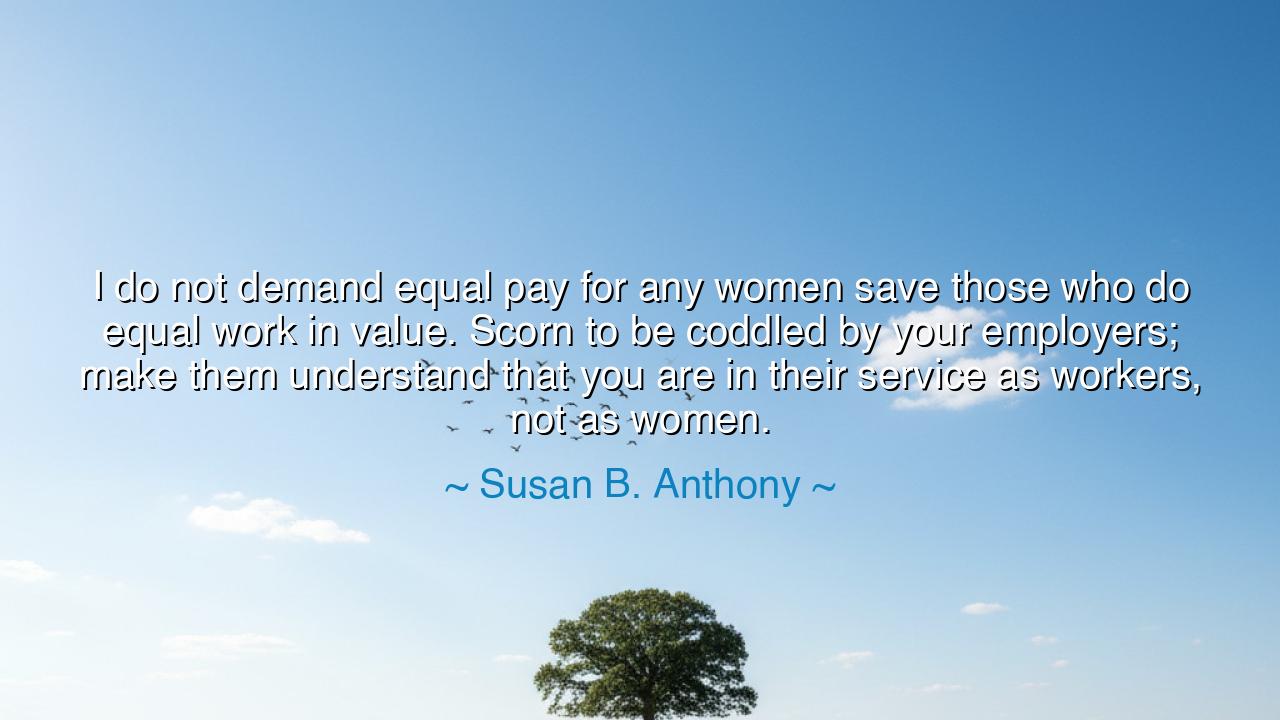
I do not demand equal pay for any women save those who do equal
I do not demand equal pay for any women save those who do equal work in value. Scorn to be coddled by your employers; make them understand that you are in their service as workers, not as women.






The words of Susan B. Anthony cut with the clarity of tempered steel: “I do not demand equal pay for any women save those who do equal work in value. Scorn to be coddled by your employers; make them understand that you are in their service as workers, not as women.” In this, she rejects both pity and patronage, calling instead for justice grounded in fairness. True equality, she declares, is not born of indulgence but of recognition—that when women labor with the same strength, skill, and sacrifice as men, they must be rewarded with the same wage.
Anthony lived in a century when the toils of women were often dismissed as secondary, their worth measured not by their contribution but by their gender. Factories employed them for half the wages of men, fields relied on their hands without honoring their sweat. To such injustice she spoke, commanding women to reject coddling—the false kindness that veils contempt—and to stand before employers not as fragile beings, but as workers demanding their rightful due.
The history of labor gives us proof of her words. In the late nineteenth century, the women of the Lowell mills in Massachusetts struck against wage cuts and brutal conditions. They were told they should be grateful for any employment at all, as though their hunger were a privilege. Yet they answered with Anthony’s spirit, crying that they were not servants of mercy but laborers of strength. Their defiance became a seed of the labor movement, showing that women could stand shoulder to shoulder as equals in the struggle for justice.
Anthony’s rejection of special treatment was radical, for it demanded not that women be lifted by charity, but that they be measured by the same standards as men. To accept coddling would have been to accept inferiority; to demand equality was to embrace dignity. Her cry was not for protection, but for respect—for a recognition of the value of women’s work as equal to any man’s when the labor matched in worth.
So let the generations remember: equality is not won through indulgence, but through justice. To be honored as a worker is greater than to be pitied as a woman, for pity fades but justice endures. Anthony’s words remain a beacon: when labor is equal, pay must be equal; when the burden is shared, so too must be the reward. Only in this truth can the chains of inequality be broken, and the dignity of all laborers be secured.






TDNguyen Tan Duong
Susan B. Anthony’s words highlight the need for women to assert their worth based on the quality of their work rather than being treated differently because of their gender. While this is an empowering sentiment, how can we navigate a world where unconscious biases still shape hiring, promotions, and pay? Is it enough to simply demand equal pay, or should we focus on eradicating the societal and organizational barriers that continue to perpetuate gender inequality in the workplace?
L9NgTh Khanh Linh 94-20
I agree with Susan B. Anthony’s call for women to stand firm in their work and demand equal compensation based on the value they provide, not their gender. But can we really expect equality without challenging the deeper, systemic biases that continue to influence how women's work is perceived and compensated? How can we ensure that workplaces are genuinely valuing women’s contributions, rather than just seeing them as tokens of diversity?
LNLe Ngocanh
Susan B. Anthony advocates for the idea that women should be paid equally for equal work, but she stresses the need for women to refuse 'coddling.' I admire the strong stance she takes, but I wonder if this emphasis on merit and value can still be practical in today’s workplace where inequalities often persist. Is it enough to ask for equal pay, or should the focus also include a deeper shift in how women are valued in society?
NLiu Tran Manh Nguyen Linh
Anthony’s words resonate strongly with the idea that pay should reflect the work done, not the gender of the worker. However, it’s worth considering—how realistic is it to expect women to be seen purely as workers and not as women, especially in industries where gender stereotypes still dominate? Shouldn’t there be a broader conversation about eliminating the biases that devalue women’s work in the first place?
TDTrang Dao
Susan B. Anthony's quote calls for a focus on equality based on the value of work, not gender. It challenges the notion of being treated as 'women' in the workplace and encourages women to demand fairness in terms of their contributions. However, can we truly separate gender from work, especially in a society where women have historically been underpaid? Does this approach overlook the broader structural inequalities women face in the workforce?